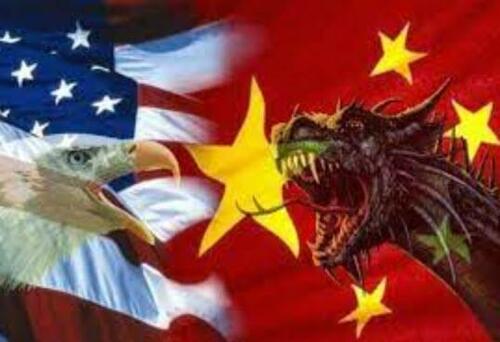Economics
Blain: China Vs The USA – Does It Have To Be War?
Blain: China Vs The USA – Does It Have To Be War?
Authored by Bill Blain via MorningPorridge.com,
“One can’t afford to be emotional about…

Blain: China Vs The USA – Does It Have To Be War?
Authored by Bill Blain via MorningPorridge.com,
“One can’t afford to be emotional about China. One needs to be realistic.”
China will remain the driver of global growth as the West continues to slide. The economy is reopening swiftly, raising increased fears of de-dollarisation. It’s easy to get emotional, but the reality is its happening, get used to it, and figure out the outcomes. They may surprise you..
The global economy constantly evolves. The IMF’s latest global growth outlook released yesterday predicts China will contribute 22.6% of global growth through to 2028, while the US will be a laggardly 11.3%, behind India at 12.9%. Europe comes in too far down to even merit a mention in the press release, but the UK, France and Germany get to 5.5% – less than Indonesia, Russia and Brazil. (The rest of Europe is a rounding error.) It’s a clear sign the global economy is headed East and away from the Western Block. Not surprising – that’s where middle class consumer numbers are growing fastest!
The IMF outlook will be questioned by some, but the trend is undeniable. Meanwhile, this morning’s Chinese economic growth numbers were strong-ish, confirming consumers have embarked on a post Covid spending binge – up 10% (from a lockdown base last year) – but aren’t buying property. The market reacted badly to a slower than expected resumption in industrial production. Mixed economic numbers? How very Western of them… (And, yes, China also has banking problems and worries about debt..)
If there is one big theme in the current market it is the question: do these numbers highlight how we stand at the end of the dollar era?
It’s convenient to price everything in dollars – but it’s particularly positive for the nation that “owns” that currency. Markets have survived switches in the de-facto global currency many times, but not always the leading nation, (witness the bankruptcies of Spain and France in the 17th and 18th centuries). If de-dollarisation is really happening it raises a host of investment consequences regarding the implications of goods priced in other coin for the USA, plus potentially a Spanish like debt/inflation crisis! Western economic growth, domestic and international trade and geopolitics will be impacted. (No Sh*t Sherlock award to myself for that blindingly obvious observation…)
There are substantial propaganda-driven “sub-themes” to how a post US-led global economy develops. Many of these make arguments to fit narratives of China emerging as the leading financial power replacing the US which involve a whole lot of angst and conflict. For instance, China’s Belt and Road Initiative is either a perfectly sensible (but poorly executed) policy to build its’ future markets, or it’s a strategy to isolate the west and secure China’s supply chain. Is conflict inevitable or can trade triumph? We chose to read China’s new alliance of Poor/Global South nations that have come out against US hegemony re Ukraine as an attempt to encircle and diminish the West, not as genuine concern by these nations on the unreliability of the West – in which they have a point.
As always there is middle ground. At the core of the de-dollarisation debate is the role of China and the US as the dominant players. Which will be Rome and which is Carthage? Does it have to be resolved via conflict? 1989 suggests not.
I’ve read some great and some awful commentary on what de-dollarisation and the emergence of China means. Variously these mix up a whole slew of future outcomes.
-
To some it’s the end of the US age of empire and/or the beginning of a new cold war which will divide the planet. To win, China must destroy the West… (There goes my investment in Baillie Gifford’s China fund…)
-
To others it’s simply a weaker dollar policy which will stimulate the US and Western economies to reindustrialise and onshore their economies, leading to new global trade accommodations which will feature more debate about demographics than missile tech.
-
It spells a new period of global growth as Asia becomes the pre-eminent centre of wealth creation, and nothing much changes except the axis has moved… The US and the West will adapt.
The theme of a new cold war is dominant among the politically infected classes in the West. To them the USA has allowed itself to be usurped and overtaken by a seemingly more competent China which has aquired its lead illegally. (All is fair in love, geopolitics and cricket.) The case says the USA squandered its right to global leadership because it is no longer the Arsenal of Democracy – that it’s surrendered its position and industrial might to China. Therefore, the baton has passed to China, or the US’ prominent position needs to be recovered.
They also have a point. Diplomacy is economics by another means. The reality is wars and national primacy are not necessarily won by courage, the best weapons, or the smartest generals, but by the best logistics and the most efficient economies, which in today’s world means who can get war stocks to the front fastest, and sustain the frightening pace at which they are expended. At its bluntest, the question is the US so over-reliant on complex supply chains that feed back to China that it can no longer exercise real power and sustainable military might to the extent that US manufacturing won WW2?
Last week’s news China may have successfully tested new D27 hypersonic cruise missiles which not only threaten US carrier groups but also the Guam bomber base thousands of miles from Taiwan may be a game changer. Or they might not work. “Might not” is probably not a good bet for a task-force Admiral, but it’s worth remembering the West always grossly overestimated the abilities and numerical odds versus the Russians and Chinese during the cold war. (At the time of Cuban Crisis, the West believed there were hundreds of Russian missiles ready to fire, in reality it was a handful… and as the Russian recently showed when they “accidently” tried to shoot to down a RAF AWACS, the missile didn’t work.)
History records all empires decline and fall. All are repeatedly challenged. There are many things wrong with America, but the debate is complex. Fears on the sustainability of the dollar are fed by increasing doubts and fears about polarised politics; the devil or the deep-blue sea not-much-of-a-choice between a Biden or a Trump, the un-addressable horror of gun crime, the rise of hatred like QAnon, the apparent threat of a debt-ceiling default, or how sustainable the debt load is. China’s support cast of nations shows the global love affair with the USA has withered. Despite some apparent backsliding by the French, Europe remains closely aligned, but the poor south has largely nailed their colours behind China.
Can the US reindustrialise in time to counter China? In today’s world that means chips as much as black powder and pig iron. But it’s also about economic prosperity, demographics, and the distribution of national wealth and happiness. Expectations are critical. This is really a battle between autocracy with Chinese characteristics and capitalism. And I’m pretty sure both sides are bluffing. It’s very much in China’s interest to build as much wealth now – while it demographically still can – rather than fight expensive, destructive wars. It’s very much in the US interest to delay in the hope China gets old before it get’s rich.
The days of US hegemony look numbered… or are they? Maybe we should be asking the question from a different perspective. Not why the USA’s time in sun is over, but why will China will replace it?
Yet, a few weeks ago I was approached to find potential funders for a deal secured on Chinese assets. The story was a wealthy family relocating offshore and wishing to invest overseas. Alarm bells were ringing. Why ask me? Why not sell Chinese property in the Chinese market through Chinese brokers. The reality was immediately clear; there are plenty of Chinese billionaires, but they are paper billionaires with little prospect of exchanging their assets for ready cash unless sanctioned by the state. There are lots of Chinese who would love to relocate to the west. How many American billionaires are heading to China? China is wealthy in Chinese terms.
Yesterday in the FT, in an article examining recent bailouts of failing Belt and Road Initiative (BRI) projects, suggested the Chinese are propping up failing infrastructure builds to “pretend and extend” the endemic scandal and corruption that has accompanied them isn’t happening or leading to debt defaults. Or, as one infrastucture banker told me: “domestically the Chinese are good at building corruption payoffs into their projects to ensure they get built – albeit less well than they might have been constructed. In third world economies they are belatedly discovering corruption plays to different rules; no one is particularly surprised that projects don’t happen after the local kleptocrats have departed with the money.”
China is now the major lender across Asia, Africa and now Latin America. Some see that as transformational in terms of the power such debt-diplomacy has given China. Others see it as money squandered buying unreliable votes at the UN. Even though China generally insists on bilateral lending to maintain tight control, the amount of Chinese “rescue lending” has increased from minimal in 2010 to over 40% of total IMF lending.
And, China has its own internal financial problems to deal with. Being able to price its critical energy and raw material imports in Yuan will help, but not avoid its own debt concerns including the build-up and size of regional and property debt.
What makes economies successful? Is it just growth, wealth or is it more?
The West won the global wars of the 20th Century by mobilising and organising resources and industrial might to strangle and hammer the frankly disorganised economies of Germany (twice) and latterly Japan. China has demonstrated it has the industrial competency, capacity, and the ability (corruption notwithstanding) to deliver growth.
However, as many people have pointed out, what won the Cold War in 1989 wasn’t just the fact the Western Democracies had outcompeted Russia in every single regard and broken its’ economy, but that the people on the East side of the Iron Curtain preferred the freedoms offered by the market economies of the Free West to the repression of Communist States. (Gawd… that reads like it was written by a Trumptard – but I’m sure you get the point…)
Emperor Xi and his court may govern as an autocracy, but the iron rice-bowl compact with the people is critical. The people may not have real votes, but they have a… voice. That’s why the Covid Pandemic Restrictions were lifted so suddenly as the state feared Tiananmen scale protests earlier this year.
The Chinese leadership are not daft – they will continue to play clever; delivering jobs, infrastructure and wealth to the people, while expanding the reach of China in the global economy through debt, infrastructure and increasingly leadership of its own economically tied block of nations. Expensive wars or cutting off supplies of Western luxuries is all so unnecessary when the numbers seem headed their way, especially when social media and fake news is proving so effective at undermining western democracies.
Whatever happens, the global economy is changing, and that means investment opportunities need reassessed – constantly.
Tyler Durden
Tue, 04/18/2023 – 16:20
dollar
inflation
markets
policy
fed
dollar policy
bailouts

Argentina Is One of the Most Regulated Countries in the World
In the coming days and weeks, we can expect further, far‐reaching reform proposals that will go through the Argentine congress.
Crypto, Crude, & Crap Stocks Rally As Yield Curve Steepens, Rate-Cut Hopes Soar
Crypto, Crude, & Crap Stocks Rally As Yield Curve Steepens, Rate-Cut Hopes Soar
A weird week of macro data – strong jobless claims but…
Fed Pivot: A Blend of Confidence and Folly
Fed Pivot: Charting a New Course in Economic Strategy Dec 22, 2023 Introduction In the dynamic world of economics, the Federal Reserve, the central bank…




















